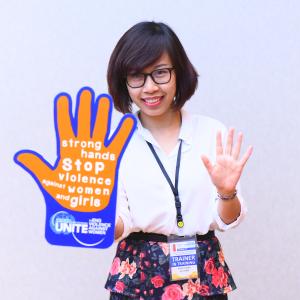Women and girls with disabilities are at higher risk of gender-based violence
19 April 2018
- Da Nang – 19 April 2018 – According to study carried out by Vietnam Assistance for the Handicapped (VNAH) in 2013, 29% of people with disabilities (PWD) in Da Nang involved in the study had been subjected to violence by strangers, 36% experienced violence by acquaintances, and 25% suffered violence at the hands of family members. Unfortunately, in Viet Nam, there are no official statistics or studies available on incidences of sexual violence and violence in groups of people with disabilities.
In this context, UN Women, in conjunction with Inclusive Development Action (IDEA) and the Da Nang Association of People with Disabilities, organized a seminar on the theme of gender-based violence against PWD to mark the occasion of the Vietnamese Day of PWD 2018. The seminar aimed to equip PWD with knowledge and situations of gender-based violence; create safe spaces for PWD to share emergent issues related to sexual and gender based violence (SGBV) against PWD; identify barriers faced by PWD, particularly those encountered by women with disabilities in accessing services for SGBV; and attract the attention of families, communities and relevant stakeholders, especially local authorities in efforts to prevent SGBV against PWD. Over fifty people with disabilities took part in the seminar in Da Nang.
In her opening remarks, Ms. Elisa Fernandez, Head of UN Women Viet Nam, emphasized that women and girls experience gender-based violence at disproportionately higher rates due to the discrimination and stigma based on the intersection of both gender and disability. "According to an international study, women and girls with disabilities experience domestic violence at twice the rate of other women and they also experience forms of violence specifically because of their disability, including isolation, violence in institutions and the withholding of medication and mobility, vision and hearing aids. Women and girls with disabilities are more likely to be subjected to forced medical treatment and reproductive health procedures without their consent."
"The achievement of the Sustainable Development Goals in Viet Nam requires a systematic commitment to "leaving no one behind", and joint efforts to advocate for inclusive and sensitive policies that take concerns and the needs of PWD, including women and girls with disabilities, into serious consideration," she added.
Mr. Truong Cong Nghiem, Chairman of the Da Nang Association of People with Disabilities, said: "This seminar has a significant meaning to groups of people with disabilities. Da Nang has developed a variety of programs and policies to end gender-based violence, domestic violence, and sexual violence; however, there are not many programs for people with disabilities so far, especially when people with disabilities are at higher risk of violence than other groups. In particular, groups of deaf people and people with an intellectual disability often suffer from sexual harassment or sexual abuse everywhere due to their limited ability to communicate. The seminar provided useful information, including on prevention and trustworthy addresses to support people with disabilities experiencing gender-based violence. And as the chairman of Da Nang Association of People with Disabilities, the seminar helped me to have a deeper understanding about the types of violence to inform my members. We hope to have more opportunities to share about gender-based violence for people with disabilities at grassroots level."



